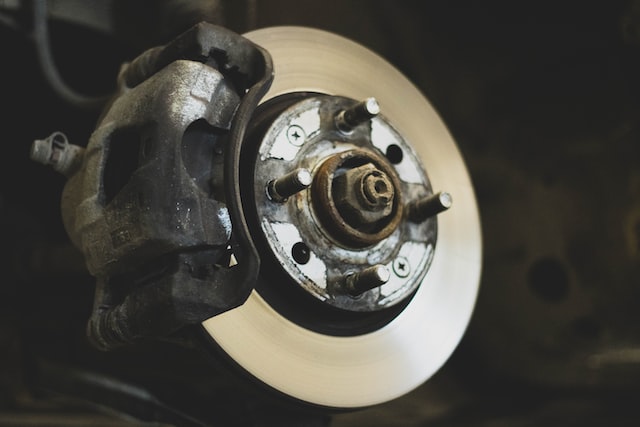
Taking care of their vehicle is an important responsibility for every car owner. And one of the most important parts of the vehicle that you should take care of and maintain is the braking system. You want to feel confident that when you drive, your brakes will stop your vehicle when you need them to. For this to happen, your car requires a reliable braking system, which includes high-quality brake pads.
Importance of Brake Pads
There are several parts that comprise your vehicle’s braking system, but perhaps the most valuable component is the brake pads. These are the two steel backing plates on each vehicle’s wheel. These plates have a friction material which makes contact with the brake rotors when you apply the brakes. This friction material forces the brake rotors to slow down and ultimately stop.
However, with this friction comes erosion. Over time, as you continue to apply your brakes, the friction material begins to wear down. As this happens, the distance between the pads and the rotors grows, resulting in slower stopping times. If the brake pads wear down completely, they’ll be ineffective at stopping the brake rotors altogether. This is why it’s important to have brake pads in good shape, as they will help to keep you safe while you’re driving your vehicle.
The Difference Between Good and Bad Brake Pads
When you’re shopping for new brake pads or having an auto repair center replace them, you want to get the best brake pads you can. After all, you’re trusting these brake pads to help you stop your vehicle, potentially at high speeds. The contrast between good brake pads and bad ones could be the difference between getting in an accident or stopping a safe distance away.
There are a few factors that make brake pads good. First, you want a long-lasting and reliable friction material. Most brake pads’ friction material is made of ceramic, which lasts for a long time. Another factor to look at is the ability to disperse heat. You want brake pads that can take the heat resulting from friction and be able to release it. Brake pads that don’t disperse the generated heat can wear down more quickly or cause other damage around the brake pads area.
Finally, you want brake pads that are unnoticeable. When you apply the brakes, you shouldn’t hear any strange noises or notice any odd smells. While many brake pads may produce smells or sounds when you first install them, high quality brake pads will cease generating those sounds or smells after a few miles of driving.
To summarize, good brake pads last a long time, disperse heat well and don’t produce any strange noises or smells. When shopping for brake pads, you should investigate these factors so that you can compare each option. And the best thing you can do is to buy genuine Toyota parts if you’re driving a Toyota.
Signs You Need to Replace Your Brake Pads
Even if you get long-lasting brake pads, there will likely come a time when you should replace them. Below are a few signs that indicate it’s time to replace your brake pads sooner than later:
Loud Noises
Most manufacturers design their brake pads to emit a loud sound when they are very worn down. At the bottom of the friction material is a metal plate. When this metal plate begins to rub against your brake rotors, you may hear a loud screeching sound. This noise has a purpose, as the manufacturer wants you to know that it’s time to replace your pads before they are completely gone. Once you notice this loud sound, schedule a maintenance appointment.
Excessive Vibrations
Excessive vibration is another common issue related to brake pads. If you apply the brakes and feel your vehicle begin to shake, there’s something wrong with the system. It could be the result of your brake pads wearing down, or it could be another issue, like uneven brake rotors. Either way, you’ll want to get this checked out before these issues become worse.
Slower Stop Times
Finally, pay attention to how long it takes to stop your vehicle. If you’re applying the brakes and it feels like it’s taking too long to come to a complete stop, this is a safety hazard. Worn down brake pads are a common cause of this, although it could also be your tires. Inspect your tires and see if there’s a significant amount of tread remaining. If so, the issue likely lies with your braking system, either with the brake pads or the brake fluid. If not, then explore getting new tires for your vehicle.
What Brake Maintenance Service Includes
When you bring your vehicle in for brake maintenance, the service technicians will do a few things. First, they will inspect your brake pads to see how much friction material remains. For brake pads with little friction material remaining, the technicians will recommend getting new pads. It’s often recommended that you replace both brake pads on a wheel simultaneously, even if one is more worn out than the other.
After that, the service technician will check other areas of your braking system. For example, for a Toyota Camry, they’ll inspect your brake rotors to see if they need smoothing or replacing. They’ll also examine your brake fluid levels to ensure there’s enough of it in the hydraulic system. If there’s a low amount of brake fluid, the technician will also look for signs of a leak. At the end of the service, you can be assured that they inspected your entire brake system and that it’s safe to get on the road again.
Let Keith Pierson Toyota Take Care of Your Brakes
If you’re experiencing an issue with your braking system, or if it’s just been a while since you’ve had brake maintenance, the team at Keith Pierson Toyota is here to help. The expert technicians at our auto service and parts center in Jacksonville can inspect your entire vehicle and correct any issues we come across. We only use high-quality parts, so you can be assured that you’re getting quality brake pads when you come to us. To get started, please schedule a service appointment today. We look forward to helping you with your vehicle’s brakes.
Image by Benjamin Brunner is licensed with Unsplash License






